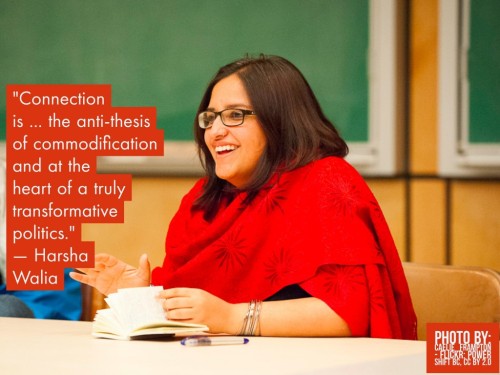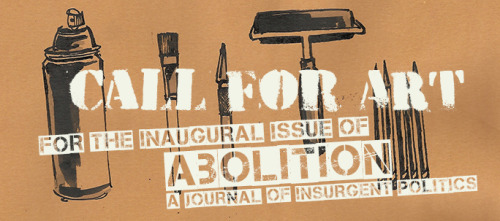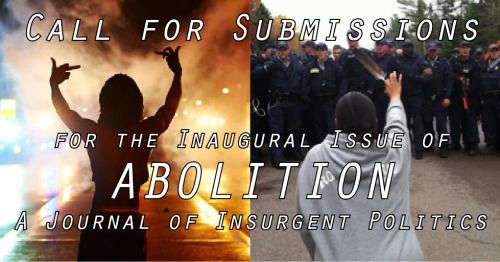#anti-colonial
”Anti-authoritarians have been great at theorizing ‘dismantling the system’, but there is less emphasis on the importance of building alternative institutions. It is no coincidence that the work of growing alternative relations and networks has largely been invisible in our movements because it is gendered labor. Both the dominant political economy and the microcosm of our movements are subsidized by the labor of those who provide childcare, cook meals, do secretarial work and provide emotional support. Even recognizing these as forms of labor is an uphill battle; we are able to articulate critiques of capital and labor in the wage economy but continue to invisibilize care work in the unwaged economy. A transformative politics requires us to rethink, reimagine and reorient work and its relationship to gender and dis/ability—what is the work that makes all other work possible? How do we foster social relations across generations and communities based on interdependency, resilience, vulnerability, and solidarity? Connection is, after all, the anti-thesis of commodification and at the heart of a truly transformative politics.”
- Harsha Walia, Dismantle & Transform: On Abolition, Decolonization, & Insurgent Politics
Post link
Abolitionis seeking submissions by artists for our inaugural issue.
Abolition: A Journal of Insurgent Politics is a new radical journal which highlights work that encourages us to make the impossible possible, to push beyond policy changes and toward revolutionary abolitionism. Today we seek to abolish a number of seemingly immortal institutions, drawing inspiration from those who have sought the abolition of all systems of domination, exploitation, and oppression. ‘Abolition’ refers partly to the historical and contemporary movements that have identified themselves as ‘abolitionist,’ but it also refers to all revolutionary movements, insofar as they have abolitionist elements — whether the abolition of patriarchy, capitalism, heteronormativity, ableism, colonialism, the state, or white supremacy. Rather than just seeking to abolish a list of oppressive institutions, we aim to support studies of the entanglement of different systems of oppression and to create space for experimentation with the tensions between different movements. Instead of assuming one homogenous subject as our audience (e.g., “abolitionists of the world unite!”), we publish for multiple, contingent, ambivalent subjectivities — for people coming from different places, living and struggling in different circumstances, and in the process of figuring out who we want to be as we transform the world. With Fanon, we are “endlessly creating” ourselves.
In this struggle, we see the voices of artists, and unique insights possible through the arts, as fundamental in both speaking back to existing systems of oppression and imagining different futures. Against the dominance of ‘academic’ rhetoric, Abolition affirms a multiplicity of ways of knowing the world. We aim to include art in the journal, not as simply illustration or supplement, but as a theory/practice of engaging with the world itself. This is a specific acknowledgement that academia (and also the written word, with whatever cultural understandings the primacy of literacy implies) doesn’t have a monopoly on knowledge or on working towards different futures. Art adds to conversations about abolition in crucial ways. Recognizing that the best movement-relevant work is happening both in the movements themselves and in the communities with whom they organize, the journal aims to support and feature artists whose work amplifies such grassroots activity. We invite submissions by artists working and creating outside the ‘white cube’ circuit whose individual practice, themes or interventions engage with the goals ofAbolitionin a meaningful way. We understand ‘art’ broadly to include many different forms and media: painting, video, drawing, poetry, multi-media, documentary, among others.
Please submit a short (200-300 word) artist statement, visual images in pdf format, online portfolio or website, or other documentation that you feel best represents your work and practice to [email protected] by January 15th, 2016.
Post link
Abolition Journal’s Inaugural Issue – Call for Submissions
Abolition: A Journal of Insurgent Politics is seeking submissions for the journal’s inaugural issue. Abolitionis a collectively run project supporting radical scholarly and activist research, publishing and disseminating work that encourages us to make the impossible possible, to seek transformation well beyond policy changes and toward revolutionary abolitionism. In that spirit, the journal invites submissions that engage with the meaning, practices, and politics of abolitionism in any historical and geographical context. This means that we are interested in a wide interpretation of abolitionism, including topics such as (but in no way limited to): prison and police abolitionism, decolonization, slavery abolitionism, anti-statism, anti-racism, labor organizing, anti-capitalism, radical feminism, queer and trans* politics, Indigenous people’s politics, migrant activism, social ecology, animal rights and liberation, and radical pedagogy. Recognizing that the best movement-relevant intellectual work is happening both in the movements themselves and in the communities with whom they organize, the journal aims to support activists, artists, and scholars whose work amplifies such grassroots activity. We encourage submissions across a range of formats and approaches – scholarly essays, art, poetry, multi-media, interviews, field notes, documentary, etc. – that are presented in an accessible manner.
Abolition seeks to publish a wide variety of work and this call is open to various forms of writing and creative material. While strict word limits will not be enforced, we suggest the following ranges for submissions:
- Short Interventions (1000-2000 words);
- Scholarly Papers (5000-10000 words);
- Interviews (3000-5000 words);
- Creative Works (open).
All submissions will be reviewed in a manner consistent with the journal’s mission. We are building relationships for a new kind of peer review that can serve as an insurgent tool to work across and even subvert the academic-activist divide and reject hierarchical definitions of “peers.” Thus, our Collective and Editorial Review Board are comprised of individuals who approach abolitionism from varied personal, political, and structural positions. Unlike most journals, our review process includes non-academic activists and artists in addition to academics. Editorial decisions will be made according to principles of anti-hierarchical power, democratic consensus, and with a preference for work produced by members of under-represented groups in the academy and publishing. For more information about the journal, please see our website,http://abolitionjournal.org. All of our publications will be accessible, free, and open access, rejecting the paywalls of the publishing industry. We will also produce hard-copy versions for circulation to communities lacking internet access and actively work to make copies available to persons incarcerated and detained by the state.
To be considered for Issue One, please submit completed work (including papers, interviews, works of art, etc.) by January 15, 2016. Submissions and inquiries can be sent to [email protected].
[Photos in banner image: Ferguson protester from James Keivom/New York Daily News; Mi’kmaq anti-fracking protester from @Osmich]
Post link


Mural inStrasbourg in memory of 8 May, 1945, when the French colonial army massacred 45,000 Algerians in the towns of Setif, Guelma and Kherrata.
On the same day that the French celebrated liberation from foreign occupation, Algerians took to the streets to obtain their own. Those demonstrations were repressed in blood on the orders of the colonial French State.
Today still, French imperialism exploits and plunders the countries of Africa and sows wars between the people to preserve its economic interests.
Sétif, Guelma, Kherrata!
We don’t forget! We don’t forgive!
My printing process
Music by Rodrigo Starz/Rebel Diaz Revolution to the Trap
Fundraiser for mutual aid to support homeless First Nations people in FNQ.
aqab.bigcartel.com/product/piss-on-ausfailure-final-print-run
More info & to donate directly here: https://www.facebook.com/donate/274258323672190/



